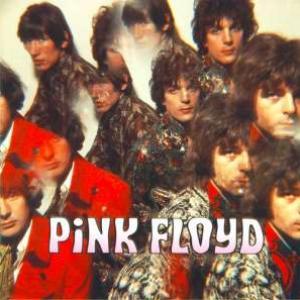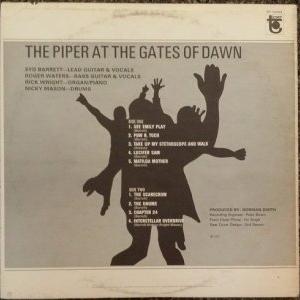The Piper At The Gates Of Dawn


| Tracklist | |||
| A1 | See Emily Play | 2:55 | |
| Notes: |
Written-By - Syd Barrett |
||
| A2 | Pow R. Toch | 4:16 | |
| Notes: |
Written-By - Syd Barrett |
||
| A3 | Take Up My Stethoscope And Walk | 3:06 | |
| Notes: |
Written-By - Roger Waters |
||
| A4 | Lucifer Sam | 3:06 | |
| Notes: |
Written-By - Syd Barrett |
||
| A5 | Matilda Mother | 2:59 | |
| Notes: |
Written-By - Syd Barrett |
||
| B1 | The Scarecrow | 2:07 | |
| Notes: |
Written-By - Syd Barrett |
||
| B2 | The Gnome | 2:11 | |
| Notes: |
Written-By - Syd Barrett |
||
| B3 | Chapter 24 | 3:51 | |
| Notes: |
Written-By - Syd Barrett |
||
| B4 | Interstellar Overdrive | 9:42 | |
| Notes: |
Written-By - Nick Mason |
||
Artwork By [Front Cover Photo] - Vic Singh
Artwork By [Rear Cover Design] - Syd Barrett
Bass - Roger Waters
Drums - Nick Mason
Engineer - Peter Bown
Guitar - Syd Barrett
Organ - Rick Wright
Piano - Rick Wright
Producer - Norman Smith
Vocals - Roger Waters
Vocals - Syd Barrett
Orange/Brown label : first 2 US issues
Multicolor label : third US issue
Track A3 printed incorrectly on the rear cover but correctly on the center label.

